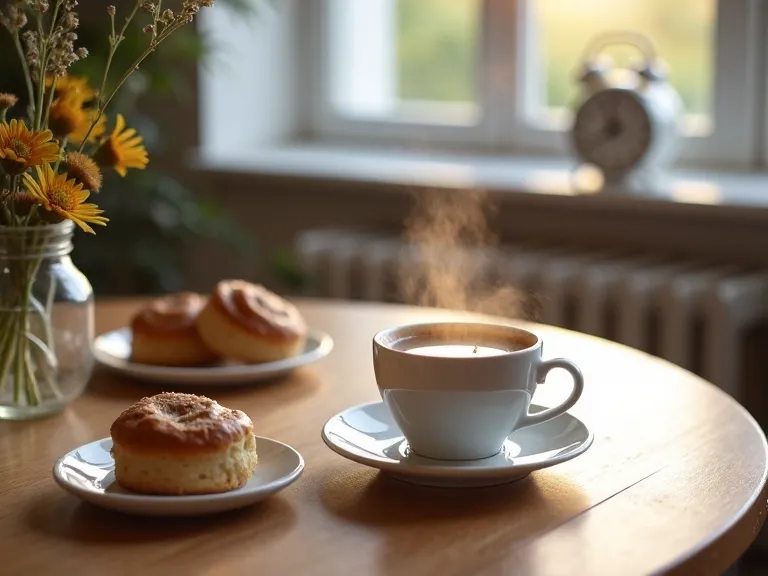Do you ever feel like you’re racing through life like a wheel, with your daily schedule so packed that you don’t even have time to breathe? We all know that feeling when the day disappears into a whirlwind of responsibilities, leaving us with increasing fatigue and declining productivity. In a world where every minute seems to be worth its weight in gold, taking time out for a… break can seem almost unwise. And yet, it’s in these brief moments of respite that the key to a more fulfilling and balanced life may lie.
In this article, we’ll take you on a journey to Sweden, where the tradition of “Fika” was born – more than just a coffee break. You’ll learn how fifteen minutes of mindful rest can dramatically improve your creativity, productivity, and well-being. You’ll learn the Swedish secret to work-life balance, as well as simple ways to incorporate this practice into your daily routine. With Fika, you’ll discover that sometimes you need to slow down to achieve more – with more joy and less strain on your health.
What is Fika – meaning and essence
Stop by. a unique element of Swedish culture, which goes far beyond a simple coffee break. At its core, it is a conscious decision to slow down and celebrate the moment with other people. Every day, at precisely 3pm, offices across Sweden come to a standstill as employees gather around tables with steaming cups of coffee and traditional kanelbullar cookies; a moment that allows Swedes to take a breath and recharge their batteries before continuing their work.
Unlike the American “coffee to go” culture, Fika requires you to stop and take your time real rest. On a winter afternoon in Stockholm, when the temperature dropped to -15°C, I witnessed a group of coworkers leave their heated office to walk the three blocks to their favorite café for their daily Fika. Despite the freezing temperatures, no one considered skipping the ritual—so deeply ingrained is the custom in Swedish society.
Fika acts as a social equalizer—during these breaks, professional hierarchies often blur. At one Gothenburg tech company, the CEO sits at the same table with interns every day, chatting freely about their lives outside of work. This democratic nature of fika makes it a tool for building healthier relationships in and out of the workplace.
“We don’t have time for Fika” – this saying is practically unknown in Sweden, because as the Swedes say: there is always time for Fika, no matter how tight the schedule is.
Fiki culture in everyday life of Swedes
Fika is much more than just a coffee break – it is a fundamental element of Swedish cultural identity, deeply rooted in the everyday lives of the inhabitants of this Scandinavian country. Swedes treat fika as a sacred ritual, a moment of respite from the intense pace of life, when you can stop, enjoy aromatic coffee and traditional pastries, such as kanelbullar (cinnamon buns) or kladdkaka (moist chocolate cake).
As Lars Andersson, a sociologist at Uppsala University, notes: "Fika is not a luxury for us Swedes, but a necessity. It is a space where we build relationships, regenerate and celebrate the simple pleasure of being together". In most Swedish companies, fika breaks are built into the workday, and trying to skip them can be seen as an unprofessional approach to work-life balance.
– I can't imagine a day without fika – says Elsa, a 67-year-old Stockholm resident, pouring coffee into cups. – When I was young, it was sacred. I remember my grandmother saying: "You can save on everything, just not on coffee for fika! Because if you don't have a good coffee, the conversation won't taste good!" And you know what? She was absolutely right, my dears. Young people these days are always rushing somewhere, but when it's time for fika, even they slow down.
| Aspect of Fiction | In the work environment | In private life |
|---|---|---|
| Frequency | Usually twice a day (approx. 10:00 and 15:00) | 1-3 times a day, often spontaneously |
| Duration | 15-30 minutes | 30 minutes to 1 hour |
| Social significance | Building professional relationships, networking | Strengthening family and friendship ties |
The social dimension of Fiki – building relationships
Fika goes far beyond a simple coffee break – connects people and creates a space where we build authentic bonds. When we meet for a cup of coffee and a cinnamon bun, we not only relax, but above all talk, listen and get to know each other more deeply. The Swedes have made Fiki a daily social practice that encourages sharing thoughts without rushing and time pressure.
In the digital age, when we communicate mainly through screens. Without deeper contact. Without real presence. Fika reminds us of the value of physical closeness and unmediated conversation.. Studies show that regular breaks spent together increase job satisfaction, strengthen the sense of belonging and improve the organizational climate. That is why many companies consciously introduce the Fiki culture, knowing that teams that drink coffee together cooperate better and solve problems more effectively.
Fika in the context of work-life balance
The Swedish tradition of fika is a fascinating example of work-life balance, which is so important in today's world full of stress, pressure, excessive demands. Fika is more than just a coffee break - it is a cultural element deeply rooted in Swedish society. In corporate culture, it is part of the strategy conscious management of employee energy, supporting their mental well-being.
Tests WHO (World Health Organization) clearly indicate: regular breaks increase productivity. A short break from duties. A moment for coffee. A conversation with colleagues. All this reduces stress levels, improves concentration, and enhances creativity. Fika fits perfectly into these recommendations, offering a structural framework for a daily practice of mental renewal.
Swedish companies regularly include fika in their work schedule. It usually takes place twice a day – in the morning and in the afternoon. Employees meet in specially designated spaces. They enjoy coffee. They talk. They build relationships that go beyond the formal organizational hierarchy. It is during these informal meetings that the most innovative ideas are often born.
"Fika is not a break from work - it's an investment in better work" – as the Swedes say. In the context of time and energy management, introducing fika into the organizational culture can bring tangible benefits to companies operating in various sectors. Research conducted by OECD (Organization for Economic Co-operation and Development) show that Scandinavian countries, despite shorter working hours, achieve higher productivity than many other developed countries. The secret may lie in a small cup of coffee and a piece of cake, eaten together in an atmosphere of mutual respect and understanding.
Fika – the Swedish Secret to Everyday Happiness
Rush stopped, relationships strengthened
Fika, the traditional Swedish coffee break, is much more than just a moment to have a drink. It is a conscious celebration of everyday life that allows Swedes – a nation known for their high level of happiness – to find balance in their busy lives. Unlike the rushed “coffee to go”, fika requires stopping and being mindful of the moment.
The most important elements of fika are:
- Regularity – fika inscribed in the daily rhythm creates points of stability
- Simplicity – a cup of coffee and kanelbullar (Swedish cinnamon buns) are enough to create a moment of happiness
- Building relationships – fika is a time for real conversations, away from professional commitments
- Balance – short breaks paradoxically increase productivity and life satisfaction
Try introducing fika into your life today! Plan a short, 15-minute break during the day, prepare a simple coffee, tea or your favorite drink, add some sweets and – most importantly – put your phone away. Invite a coworker, a friend or simply celebrate this moment for yourself. This simple, Swedish practice – the essence of good living – can radically change your approach to everyday life.
Start your fika today!
Download our free guide, 7 Days of Fika, and discover how this simple practice can change your life.
Frequently asked questions
What exactly is Swedish fika and why is it so important in Swedish culture?
Fika is much more than just a coffee break – it is a tradition deeply rooted in Swedish culture, which involves celebrating a moment of rest with a cup of coffee and, most often, a sweet treat. It is extremely important because it symbolizes the balance between work and rest and emphasizes the value of building interpersonal relationships in the everyday lives of Swedes.
How do I incorporate fika into my daily life, especially with a busy schedule?
Introducing fika into your daily life is easier than it sounds. Start by scheduling a 15-minute break during the day, preferably at a set time. During this time, put down your phone, close your computer, and focus solely on enjoying your coffee or tea and a small treat. Over time, you can invite coworkers or loved ones to join in this tradition, creating space for valuable conversations and building relationships.
What mental health benefits can regular fika practice bring?
Regular practice of fika can significantly affect our mental health. First of all, it helps reduce stress by consciously detaching ourselves from our duties and focusing on pleasure for a moment. It also helps build social bonds, which is a key element of mental well-being. What's more, regular breaks during the day improve concentration and creativity, which translates into better efficiency when returning to work.







